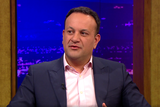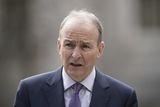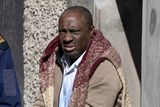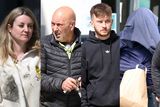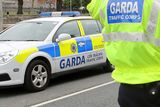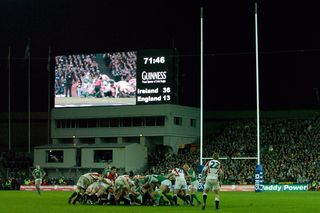Miami Showband massacre: 'You don't have to die to lose your life'
Forty years later and survivor Stephen Travers still feels the raw hurt and pain.
As he lay there in a roadside field, with blood streaming from his right thigh and left upper body, Stephen Travers had to make the most chilling of decisions.
Did he pull himself to his knees and beg the gunmen not to kill him or play dead?
In the end he chose the latter…and it saved his life.
It's 40 years since the smell of death hung in the air above Buskhill, on the road between Banbridge and Newry, when three of Ireland's most well-loved musicians were brutally murdered by Loyalist paramilitaries assisted, it's claimed, by members of the British security service.
In the lobby of a hotel in Cork city where he now lives, Stephen tells me: "You don't have to die to lose your life. In many ways, those who were left behind that night lost their lives too."
The Miami Showband's frontman Fran O'Toole (29), guitarist Tony Geraghty (23) and trumpeter Brian McCoy (32) were all murdered after the minibus in which they travelled in the early hours of July 31, 1975, had been stopped in the darkness.
Travers, and sax player Des McAlea, miraculously survived.
"It might be 40 years on but not one minute of the day passes that I don't sense the impact of it. Trauma is so difficult because it's impossible to articulate how it feels. We'll never get peace," explains Stephen in soft tones.
The band members were returning over the border after playing to a packed audience at the Castle Ballroom in Banbridge, Co Down. One of Ireland's leading bands at the time, their music and line-up transcended the border. "Even Brian McCoy's father was the grandmaster at an Orange lodge in Tyrone," explains Stephen, adding: "We had no interest in politics, we just wanted to play music."
Life, at the time, couldn't have been better for the 24-year-old Stephen. Months earlier he'd wed the love of his life, Anne, and in late May 1975 had decided to join the band.
He and other band members were enjoying a game of cards when lights appeared in the distance and their minibus was stopped at what appeared to be a routine British army /Ulster Defence Regiment (UDR) checkpoint.
They were taken from the van and lined up facing a field by the roadside. Initially, the soldiers were jovial, one asked 'Which one of you is Dickie Rock?' but when a more senior officer arrived, the tone changed.
"He had all the bearings of someone used to being in command, however it was his English accent, his educated, curt, military voice that really caught my attention," recalls Stephen.
As soldiers rummaged in the back of the minibus, Travers became irritated, fearing his bass guitar would be damaged. He stepped out of line to see what was going on, but was punched from behind into the kidneys and told to return to the line, which he did, all be it to a different position. This shift may have saved his life.
Unbeknownst to the band members, two soldiers were placing a bomb under the driver seat.
"The plan was it would explode when we were over the border. They could claim we were republicans who got caught out transporting explosives. I'd have been consigned to history as a terrorist, my family name would have been disgraced forever, my young wife would be the widow of a terrorist, my daughter would never have been born and the civilised world would have believed a terrible and tragic lie," says Stephen.
"It was a brilliant plan, had they pulled that off they wouldn't have just framed us, they would have framed an entire nation, an entire people. It would have been carte blanche for Britain to deal with every Irish person as a potential terrorist - just how Palestinians are treated."
But the bomb did go off, killing the two soldiers instantly. As Stephen twisted in the air, he was struck by a dum-dum bullet. His fellow bandmates Fran, Tony and Brian were brutally and methodically executed after pleading for their lives. The band's fifth member, Des McAlea, had miraculously been blown clear of the minibus into a ditch where he was able to hide. The massacre sent shockwaves around the world.
In the decades after, Stephen tried to move on from the tragedy. The Miami band reformed, but he spent less than nine months in it. "It didn't feel right, people were not coming to listen to us, they were coming to see us, we were something of a circus."
At home he was a changed man. "My wife, Anne, said after the tragedy that she had to learn to live with and love a different person."
In recent years Stephen has been diagnosed with a condition known as Enduring Personality Change.
For years afterwards he'd check under his car every morning in case a bomb had been placed beneath it during the night.
In an attempt to find space, Stephen and Anne moved to London in 1982, their daughter Sean was born, and they returned to Ireland in 1997…. but Stephen, from Carrick-on-Suir, admits now that he'd never allowed himself to understand what happened that awful night in 1975 and evaluate its full impact.
"It was on the 30th anniversary that I decided to think about things again, to confront them properly. Trying to understand what happened actually makes it a lot harder, but in 2007 journalist Neil Fetherstonhaugh and I wrote a book about it and while that was difficult, it was, in a way, cathartic," says Stephen.
Incredibly, during the course of writing the book, Stephen met a senior member of the Ulster Volunteer Force (UVF) to ask why the attack took place.
"The meeting lasted five hours. Initially, I was told a lot of nonsense, that there was a long timer on the device and we were supposed be at home in bed when the bomb exploded."
Having listened to the UVF explanation, Stephen politely interjected and asked the individual known as 'The Craftsman': "Do you believe the men who murdered my friends disgraced the noble cause of unionism?"
This rattled the former paramilitary and softened the tone of the meeting. "It showed I respected their cause but at the same time I was telling him that murder in the name of any cause is disgraceful," says Stephen.
Two serving UDR soldiers, Thomas Crozier and James McDowell, and one former UDR soldier, John Somerville, received life sentences for the murders. In 2007, Travers attempted to meet Crozier at his home, but despite making two trips to the front door of the convicted man's house, and seeing movement inside, the door was never answered.
Currently Travers and the families of the victims of the Miami massacre are taking an action against the UK Ministry of Defence and the Police Service of Northern Ireland in a bid to expose the extent of state involvement in the killings.
And next week lawyers acting on their behalf will issue a plea for those with information about what happened to come forward.
"We will be putting out an appeal for witnesses, namely ex-UDR members who raised concerns about the infiltration of their forces by loyalist paramilitaries while they were serving members," says Stephen.
He tells me that he has never felt anger or bitterness towards those who killed his three friends that night.
"I've never been angry at anybody but I certainly am angry at a system that not only facilitated what happened back then but one that denies involvement and attempts to cover up the role it played even to this day."
Stephen has co-written a screenplay for a film on his book, The Miami Showband Massacre, with renowned Hollywood producer Peter Crane on board, they are in talks with an Irish production company about moving the project further.
Today, he speaks at conferences about the need to listen to the victims of terrorism.
Stephen told me: "At the end of the day, I'm just a musician. I never asked to have been dragged into something so awful but if I can help others, I will.
''I want to convince them that it's better to wear a band suit than a balaclava... and better to pick up a bass guitar than a bomb."
Join the Irish Independent WhatsApp channel
Stay up to date with all the latest news
